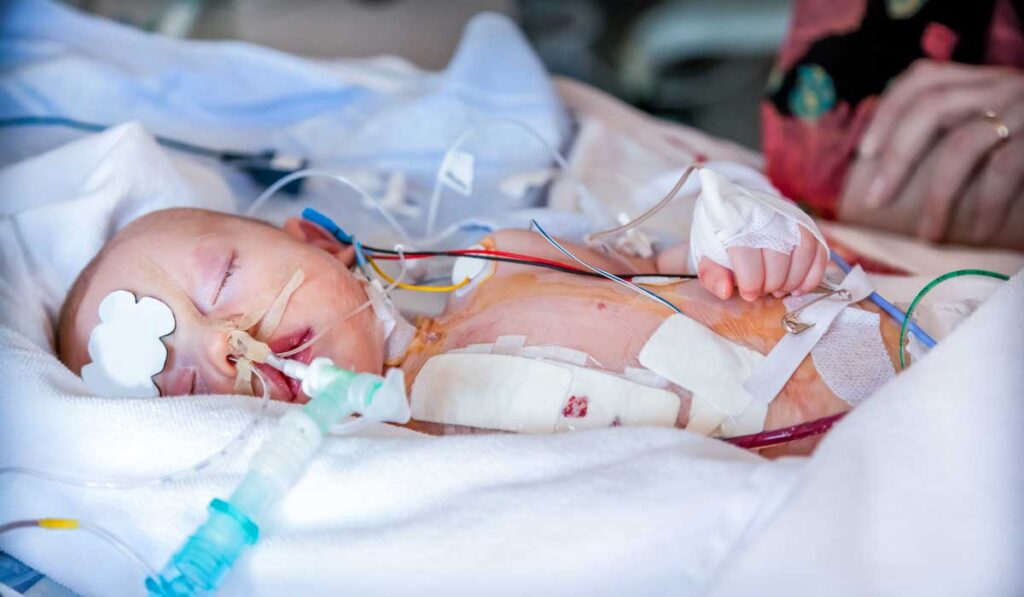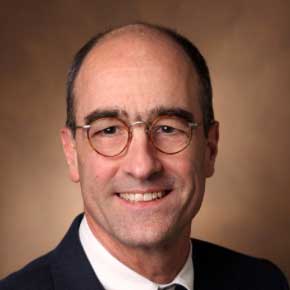Twenty-three pediatric heart transplants were completed last year at Monroe Carell Jr. Children’s Hospital at Vanderbilt, plus another 124 adult heart transplants completed at Vanderbilt University Medical Center. Vanderbilt performed more heart transplants in 2020 than any other center in the world.
“New ways to support infants, children and adults with heart failure, advances that allow more donor hearts to be usable, and extraordinary collaborative teamwork with our pediatric heart failure and transplant, adult congenital heart disease and liver transplant teams, all contribute to our growth and success,” said David Bichell, M.D., chief of pediatric cardiac surgery at Children’s Hospital. “Despite the challenges of the pandemic, the Vanderbilt congenital heart and heart-liver transplant programs are growing, with complex patients referred from all over the country.”
Crossover Transplant Teams
Since the heart transplantation program began in 1985, the Vanderbilt Transplant Center has performed over 1,500 procedures. They currently provide ongoing care for over 600 heart transplant recipients, as well as multiple patients with advanced heart disease who are on the waitlist.
Vanderbilt’s adult and children’s hospitals are steps away from one another, promoting the sharing of surgical expertise that boosts success across both transplant enterprises. Expertise extends far beyond the surgical suite and includes psychiatric specialty care for children and adolescents facing transplant, perioperative coordination, and later in life, pregnancy guidance for heart recipients. Vanderbilt is also nationally known for its congenital heart disease specialists.
“Mechanical circulatory support in this young age group has been classically very difficult compared to other age groups, but we have had excellent success bridging our sickest infants to transplant.”
VAD Use Expanding
The pediatric transplant program opened in 1987, just two years after the launch of the adult program. Program leaders Bichell and Debra Dodd, M.D., medical director of the Pediatric Heart Transplant Program, have steadily seen the program grow.
Helping enable this is the ability to use ventricular assist devices (VADs) in ever-younger patients. This year, six patients – five of them less than one year old – were placed on VADs at Vanderbilt. “Mechanical circulatory support in this young age group has been classically very difficult compared to other age groups, but we have had excellent success bridging our sickest infants to transplant,” Dodd said.
To help restore more life normalcy, Vanderbilt is diverting more young VAD patients away from the ICU. Increasing numbers of patients awaiting transplant are being transferred to the cardiac floor, or even home.
Addressing Psychological Distress
Vanderbilt providers are finding additional ways to help in the emotional care of young patients around the transplant procedure. Providing close monitoring and counseling to patients and their families is a priority at Children’s Hospital.
“There is an expanding role for transplant from the infant to adult end of the age spectrum, and it is rewarding to be part of a team that delivers quality of life to many who had no such options not so long ago.”
Vanderbilt researchers have found that 39.8 percent of pediatric patients requiring VAD at heart transplantation suffer from a psychiatric disorder. Depression or anxiety during or preceding pediatric transplant admission is independently associated with higher rates of readmission, and depression is associated with inferior graft survival.
To address the emotional care of patients, the team includes a psychologist and social worker, who counsel and make referrals to psychiatrists. Selective serotonin reuptake inhibitors (SSRIs) and selective non-adrenaline reuptake inhibitors (SNRIs) are shown to be helpful in 92 percent of adult transplant patients and the Vanderbilt team says are increasingly prescribed for young patients as a short-term measure.
Ongoing Growth
The need for transplantation continues to grow, say the researchers, in large part due to the higher early survival rate of babies with congenital heart disease. The Vanderbilt team stands ready to push the survival curve ever higher in even the youngest and most complex cases.
Said Bichell, “There is an expanding role for transplant from the infant to adult end of the age spectrum, and it is rewarding to be part of a team that delivers quality of life to many who had no such options not so long ago.”







